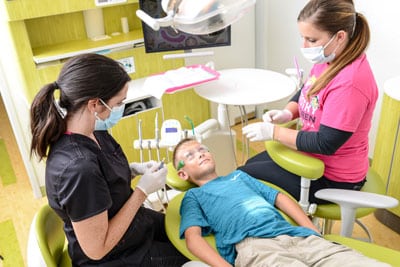Why See A Pediatric Dentist?
As parents, ensuring the well-being of our children is our top priority, and their oral health is no exception. Seeing a pediatric dentist is essential because these specialized dental professionals have the expertise and experience to provide tailored care for young patients. At Alligator Dental, serving Cibolo, Gonzales, San Marcos, and Seguin, TX, our team of dedicated pediatric dentists understands the unique needs of children, creating a warm and inviting atmosphere to make dental visits enjoyable for kids.

Pediatric dentists possess the knowledge to address the specific dental challenges that arise during childhood, from teething and cavity prevention to orthodontic evaluations and guidance on proper oral hygiene habits. Regular visits to a pediatric dentist allow for early detection of any potential dental issues, ensuring prompt intervention and preventing problems from escalating. These early visits also help children become familiar with the dental environment, reducing fear and anxiety associated with dental care and encouraging positive attitudes toward oral health as they grow older.
By partnering with a pediatric dentist, parents can ensure that their child receives comprehensive and age-appropriate dental care, setting them on the path to a lifetime of healthy smiles and positive dental experiences. Schedule an appointment with Alligator Dental today to give your child the best start to excellent oral health!
What is a Pediatric Dentist?
A pediatric dentist is a specialized dental professional who provides comprehensive oral health care for infants, children, and adolescents. These dedicated dental experts undergo additional training beyond dental school to understand and address young patients’ unique needs and concerns. Pediatric dentists create a child-friendly environment to ensure a positive and comfortable experience for children during dental visits. They are skilled in managing children’s oral health from the emergence of their first tooth through their teenage years. Pediatric dentists offer a wide range of services, including dental check-ups, preventive care, early cavity detection, fluoride treatments, dental sealants, and guidance on proper oral hygiene practices tailored to the age and developmental stage of the child. Their expertise in pediatric dentistry ensures that children receive the specialized care they need to develop and maintain healthy smiles, laying the groundwork for a lifetime of good oral health habits.
Prevention
Prevention is the cornerstone of maintaining good health, and this applies to all aspects of our well-being, including oral health. In dentistry, prevention involves taking proactive steps to avoid dental issues before they occur. Our pediatric dentists emphasize the importance of regular dental check-ups, cleanings, and early cavity detection to address any concerns promptly. They also educate parents and children on proper oral hygiene practices, the significance of a balanced diet, and the use of dental sealants and fluoride treatments to protect young teeth from decay. By instilling these preventive measures, pediatric dentists aim to establish a strong foundation for optimal oral health, enabling children to enjoy bright, healthy smiles throughout their lives.
Early Detection
Early detection is key to addressing dental problems in their initial stages when they are most treatable and least invasive. Regular dental check-ups enable our pediatric dentists to spot early signs of cavities, gum disease, and other oral issues. Early detection allows for timely interventions, preventing problems from worsening and potentially saving your child from more extensive and costly treatments in the future. This emphasis on early detection underscores the importance of regular dental visits for children of all ages.
Education
Education is vital in empowering parents to take control of their child’s oral health. Educating patients about proper oral hygiene practices, the importance of a balanced diet, and how lifestyle choices can impact their child’s dental health. Educating parents on preventive measures empowers them to make informed decisions about their child’s oral care, fostering a sense of responsibility for their dental well-being. With the right knowledge and guidance, your child can develop positive oral health habits and maintain a healthy smile throughout their life.
Our Dental Locations in Cibolo, Gonzales, San Marcos, and Seguin, TX
Our team is spread across multiple locations, ensuring you’re never too far from an Alligator Dental clinic! Whether you’re in Cibolo, Gonzales, San Marcos, or Seguin, TX, our dentists are ready to provide top-notch care and make dental visits a truly memorable experience.
Pediatric Dentist in Cibolo, Gonzales, San Marcos, and Seguin, TX
Our team of pediatric dentists are waiting to provide your child with the most amazing dental care experience. Call us to schedule an appointment with Dr. Alfred Burns, Dr. Anas Hakimeh, or Dr. Dorothy Causey.

